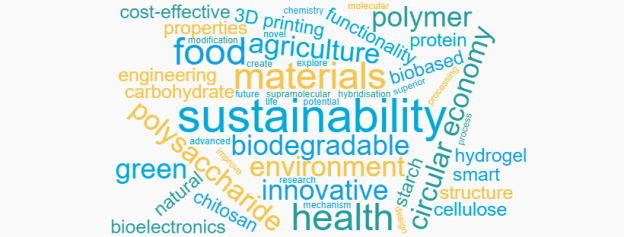Dr David Fengwei Xie leads a group conducting cutting-edge research grounded in polymer science to address sustainability, health, and food-related issues. Our primary focus centres on biopolymers, including polysaccharides and proteins, which can be sustainably sourced from renewable biomass. We leverage these biopolymers to create materials and composites with superior performance and environmentally considerate end-of-life considerations. Furthermore, our research extends to exploring the functional attributes of biopolymers in the realm of food applications. This encompasses an array of aspects, from texture and health benefits to preservation and packaging. Our research is structured around three core pillars: a) fundamental polymer/food science, b) advanced polymer engineering, and c) smart materials design. Our capabilities in manipulating food and material microstructures and establishing the crucial structure-property relationships of polymers empower us to effectively tackle application-related challenges.
Current research
- Polymer (nano)composites
- Green processes for biopolymers
- (Bio)polymer films and coatings
- (Bio)polymer hydrogels
- 3D printing of (bio)polymer materials
- Stimuli-responsive and functional (bio)polymer materials
- (Bio)polymer materials for biomedical, electronics, sensing, energy and environmental applications
Research interests
We possess well-equipped research facilities and a wealth of expertise in (bio)polymer science and engineering, allowing us to conduct research and collaborate across various aspects:
- Biomass utilisation
- Natural biopolymers, including polysaccharides (e.g. cellulose, chitin/chitosan, starch, alginate, pectin, carrageenan, xanthan gum) and proteins (e.g. collagen, gelatin, silk fibroin)
- Other compostable/degradable polymers (e.g. PVA, PLA, PHA, PCL, PBSA, PBS, PBAT)
- Polyurethanes
- Dissolution, modification, processing and characterisation of biopolymers
- Polymer processing: 3D printings, electrospinning, casting, moulding, extrusion
- Different material forms: films, coatings, hydrogels, aerogels, fibres, particles
- Characterisation of material structure and properties: thermal, rheological, mechanical, microscopy, spectroscopy, etc.
- Rheology and printability of liquids, pastes and melts
- Polymer composites
- Functional polymer materials (e.g. antimicrobial, electroconductive, stimuli-responsiveness, controlled release, pollutants absorption)
- Food materials: texture and health effects
- Edible films and packaging
- Sustainable, compostable/biodegradable and disposable materials
- Biopolymer materials for pharmaceutical and biomedical applications (e.g. wound dressing, tissue scaffolding, drug release)
Our strong research capabilities empower us to collaborate with the industry, driving technological breakthroughs and championing sustainable practices in the circular economy. If you’re interested in partnering with us or offering financial support for our research projects to address your technical challenges and enhance your products, please don’t hesitate to get in touch with us.
